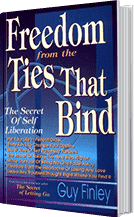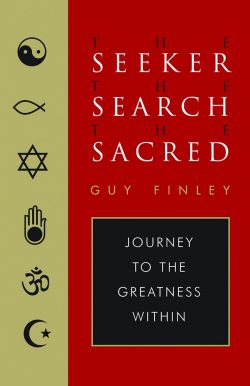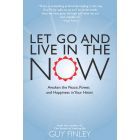The more we awaken to realize our true role in life is to fill the gap between "what is" with "what has been" -- by agreeing to die to any part of us that would otherwise interfere with its atonement -- the more we see the truth that sets us free: our willingness to make this sacrifice aligns us, on the spot, with an ineffable peace that is inseparable from actualizing our Divine responsibility in the fullness of Time.

- FREE CONTENT Home
-
Browse Topics
Home
Access over 500+ Hrs of Basic Content for as low as $4.97/month!
Sign up today!SearchPopular Searches Today: help you fear SPIRITUAL PRINCIPLES Law Of Attraction freedom from the ties that bind-
Select Category
-
Browse from A-Z
-
Go Deeper!
- Inspire Me
Join Life of Learning'sWISDOM SCHOOL
Make self-realization part of your daily life – become an aspirant and join Life of Learning’s online community.
You'll gain access to:- 500+ hours of premium content
- Online courses
- Study and discussion groups
- Q&A with Guy
- Daily meditation emails
- New content added every week
- Download audio and video content
- And much more...
Click for Quick Inspiration!
-
-
Online Wisdom School
Home
Welcome to Life of Learning's Online Wisdom School
Access an In-Depth, Multi-Media Resource of Higher Wisdom, Online or On-the-Go!
Sign up today!FreeYou need an active subscription to enjoy more access.
Subscribe to unlock more content.
Watch/Listen
Deeper Learning
 Learn More
Learn MoreJoin an Active Community of Fellow Seekers
Access Over 500+ Hours of Premium Content Today! Try it Completely RISK FREE for 30 days!
Articles
Enlightening articles by Guy Finley on a wide range of topics address practical life issues and deepen your spiritual understanding.
Inspirational Quotes
Short but powerful quotes by Guy Finley will inspire you throughout your day.
Guy's Letters
Heartfelt inner-life questions from people around the world, and Guy’s enlightening answers, will shed light on your own issues.
Guy's Blog
Read Guy’s newest insights as he jots them down, spontaneous and uncensored.
This Week's Topic
Watch or listen to the specific talk we will all be discussing during this week’s Online Study Group meeting.
Short Talks
If you have a few minutes, and want a burst of enlightenment, watch or listen to these brief talks by Guy, filled with concentrated wisdom.
Interviews & Radio Shows
Hearing Guy interact with an interviewer is a delight. Listen as he makes deep spiritual principles easy to understand.
Student Reports
Be encouraged by hearing fellow members share their experiences and discoveries as they bring higher ideas into their daily lives.
Sacred Music
The Life of Learning singers and instrumentalists perform beautiful music that will inspire and uplift you.
Livestream Classes
Join us for exclusive live broadcasts of select Guy Finley talks.
Daily Meditation Emails
Start your day off right with a nugget of wisdom that can transform your experience with everything you do and everyone you meet.
Special Lessons
Inner-life exercises and special writings deepen your understanding.
Student Talks
Longtime local members speak for 10 to 15 minutes on a special topic. Hear the explorations and discoveries of others on the inner journey.
eCourses
Dive deep into a subject on your own! Work at your own pace with a series of talks by Guy on topics critical to your inner development.
Advanced Inner Life Talks
Catch Guy Finley’s weekly message that focuses on spiritual and personal breakthroughs. This is updated weekly and is available in video, audio and text.
Online Study Group
Join a lively online discussion with other members each week of “This Week’s Topic” – a new Guy Finley talk selected for in-depth study.
Study Group Recordings
You are not alone on the inner journey. Listen to lively, weekly online discussions between members.
Saturdays with Guy
Every Saturday Guy leads an open discussion. Local members share their discoveries, and Guy’s comments deepen everyone’s understanding.
Student Q&A with Guy
Guy regularly holds open Q&A sessions. Often members of our global community send in questions, or speak directly to Guy online.
Facebook Private Group
Access to all our private Facebook updates, student Facebook discussions, and our LIVE Saturday lunch roundtable discussions.
Discussion Forum
This member forum is where you can write in your observations and experiences, and receive feedback from fellow members. Read-only access for Free and Basic members. Full access for Premium & All Access members.
Articles
Enlightening articles by Guy Finley on a wide range of topics address practical life issues and deepen your spiritual understanding.
Inspirational Quotes
Short but powerful quotes by Guy Finley will inspire you throughout your day.
Guy's Letters
Heartfelt inner-life questions from people around the world, and Guy’s enlightening answers, will shed light on your own issues.
Guy's Blog
Read Guy’s newest insights as he jots them down, spontaneous and uncensored.
This Week's Topic
Watch or listen to the specific talk we will all be discussing during this week’s Online Study Group meeting.
Short Talks
If you have a few minutes, and want a burst of enlightenment, watch or listen to these brief talks by Guy, filled with concentrated wisdom.
Interviews & Radio Shows
Hearing Guy interact with an interviewer is a delight. Listen as he makes deep spiritual principles easy to understand.
Student Reports
Be encouraged by hearing fellow members share their experiences and discoveries as they bring higher ideas into their daily lives.
Sacred Music
The Life of Learning singers and instrumentalists perform beautiful music that will inspire and uplift you.
Livestream Classes
Join us for exclusive live broadcasts of select Guy Finley talks.
Daily Meditation Emails
Start your day off right with a nugget of wisdom that can transform your experience with everything you do and everyone you meet.
Special Lessons
Inner-life exercises and special writings deepen your understanding.
Student Talks
Longtime local members speak for 10 to 15 minutes on a special topic. Hear the explorations and discoveries of others on the inner journey.
eCourses
Dive deep into a subject on your own! Work at your own pace with a series of talks by Guy on topics critical to your inner development.
Advanced Inner Life Talks
Catch Guy Finley’s weekly message that focuses on spiritual and personal breakthroughs. This is updated weekly and is available in video, audio and text.
Online Study Group
Join a lively online discussion with other members each week of “This Week’s Topic” – a new Guy Finley talk selected for in-depth study.
Study Group Recordings
You are not alone on the inner journey. Listen to lively, weekly online discussions between members.
Saturdays with Guy
Every Saturday Guy leads an open discussion. Local members share their discoveries, and Guy’s comments deepen everyone’s understanding.
Student Q&A with Guy
Guy regularly holds open Q&A sessions. Often members of our global community send in questions, or speak directly to Guy online.
Facebook Private Group
Access to all our private Facebook updates, student Facebook discussions, and our LIVE Saturday lunch roundtable discussions.
Discussion Forum
This member forum is where you can write in your observations and experiences, and receive feedback from fellow members. Read-only access for Free and Basic members. Full access for Premium & All Access members.
Articles
You need a membership to access this content.
Inspirational Quotes
You need a membership to access this content.
Guy's Letters
You need a membership to access this content.
Guy's Blog
You need an membership to access this content.
Begin Your Spiritual Journey
Pick a Plan and Sign up Today!
-
Store
Home
Access 500+ hours of Basic Content for as low as $4.97/month!
Sign up today!SearchPopular Searches Today: help you fear SPIRITUAL PRINCIPLES Law Of Attraction freedom from the ties that bindBooks
You can find softcover and hardcover books in our store. Many of Guy’s works are also available as eBooks.
Shop BooksAudio
Listen to Guy’s talks on CD or MP3. Some of his books are also available as audiobooks.
Shop AudioVideo
Watch Guy on DVD or MP4 as he presents talks on a wide array of topics related to your spiritual discovery.
Shop VideoeCourses
Our eCourses focus on specific topics, building your understanding through a series of related talks. Most eCourses include MP3 audio and MP4 video formats you can play online.
Shop eCourses - Events
- Inspire Me
-
Search
SearchPopular Searches Today: help you fear SPIRITUAL PRINCIPLES Law Of Attraction freedom from the ties that bind

The Promise of Greater Possibilities Yet Realized
- Posted: Saturday, October 12, 2019
- 1397 words
Can we see how, in one form or another, everything in creation longs to touch and to be touched? Flowers and trees stretch their leaves and limbs up to the sun, just as it reaches down to touch them. After all, to what end the timeless nature of such radiance, if not to grant life to whatever forms it temporarily animates?
We can clearly see that this invisible law of mutual attraction permeates the whole of nature. Fields of grain summon small birds to carry away their seeds; every breeze searches for something to move. Raindrops rush down to slake the thirst of a parched earth, even as water-laden clouds are drawn high into the skies so they can pour themselves out. Streams seek out rivers that rush down to merge with the sea. It's really quite clear: the great circle of life is imbued with this unique kind of "gravity" where all that lives is drawn to join itself to a larger body of life.
And, even though unable to do otherwise, we can see how all of nature's creatures work together in this way for a common good: They seek and serve each other in order to complete and perfect one another in a whole that's greater than the sum of its parts. This force that draws a bee to pollinate a flower, or a predator to consume its prey, is the touch of Mother nature's plan; through it, she accounts for the continuing perfection of the almost infinite number of creatures she holds in her hands.
Yet, as beautiful and whole as this system may sound, there's literally a "catch" to the powers needed to maintain such order. While the forms and functions of these creatures evolve over time--allowing them to meet the challenges of environmental changes, their character remains essentially unchanged. They are without choice when it comes to answering the demands of their nature. The timeless migrations of great beasts, the annual return of fish, birds, or turtles to their place of birth--including the predators called there to await their passage--all of these creatures serve planetary forces that care nothing for their individual lives.
This same law of attraction is always at work within us, asserting itself upon our lower (animal) nature as well. Its influence goes unrecognized by the sleeping masses but for those "with eyes to see," its manifestations are evident in our globally accepted social conventions.
Though we may have never looked at it in this way before, a fifty-mile long, four-hundred-foot-wide stream of cars slowly rolling along on a crowded freeway is a kind of daily migration. And what is the universal need to "feather" our nest, dominate a competitor or family member, attract the best sexual partner, make babies or plans to find better "hunting" grounds?
In fact, the hidden nature of almost all that we do on a collective basis is the direct, but unseen effect of this one great unconscious desire to search out what we believe will complete us, drawing us to seek "greener pastures" by the deft touch of its magnetic hand, but never allowing us to rest. Over countless ages untold billions of us have answered nature's "call"--much in the same way as a leaf says "yes" to the wind that carries it away. Yet, what do we receive in return for our faithful, if unquestioned consent? We're provided with a fragile, deceptive contentment; our reward is a momentary sense of fulfillment that, in most cases, passes from sight as soon as do the temporary conditions that provided it for us.
Fortunately, for those who seek to discover the truth behind this almost inconsolable discontent, every now and then certain individuals appear who see things as they are. One such revelation is found in Ecclesiastes 2:4-11, written between 250 and 180 BCE, where we can glean two things at once: first, how little human consciousness has changed over countless years, and also the inevitable sorrow that comes with having searched for lasting contentment in all the wrong places. The language may be strange to our ear, but its lesson certainly isn't.
I made me great works; I builded me houses; I planted me vineyards: I made me gardens and orchards, and I planted trees in them of all kind of fruits: I got me servants and maidens. I gathered me also silver and gold. So I was great more than all that were before me. And whatsoever mine eyes desired I kept not from them, I withheld not my heart from any joy; for my heart rejoiced in all my labour. Then I looked on all the works that my hands had wrought, and on the labour that I had laboured to do: and, behold, all was vanity and vexation of spirit, and there was no profit under the sun.
Where are we to find a solution to this seemingly inescapable situation, where our best instincts betray us because all they're empowered to do is to sell us a return ticket to the places we just left? Rumi, the 13th-century Persian poet, tells us that if we wish to bring an end to this cycle of our discontent then we must "Find the antidote in the venom!" Now let's prove the truth of this counterintuitive prescription.
Whenever we dare to stand in the light of some unwanted truth about how powerless we are to change who or what we've been--where we see that our present choices are secretly a part of what's holding us captive--we're always shown two things at once. First, and perhaps most important: we see what doesn't work; we see that our present level of understanding can't lead us to freedom because its desires are a part of what has delivered us into our "prison" of the moment. And the second part of this revelation stands in relief of the first, much like the rising sun reveals a new day. it's quite clear: we know now that if we're to succeed in our search for wholeness, we not only require a new and higher order of self-knowledge, but one that must also take us in a completely new direction. Yet, where is one to look when all the known roads through this world lead back to the same level of reality from which we started our journey?
Dr. Maurice Nicoll, noted 20th-century British psychiatrist, author, and spiritual teacher, provides us with an accurate diagnosis of our condition, as well as suggesting the new direction we must take if we wish to bring an end to our constant discontent. He stresses that if we hope to realize the lasting sense of wholeness for which we long, we must find its secret source within us.
Man has inner necessities; his emotional life is not satisfied by outer things. His organization is not only to be explained in terms of adaptation to outer life. He needs ideas to give meaning to his existence. There is that in him that can grow and develop--some further state of himself--not lying in "tomorrow," but above him.
Here we glimpse the promise of our own greater possibilities yet unrealized; disclosed is the reason why we can't shake our sense of being incomplete in spite of all we've acquired. After all, what hope is there of finding in the world situated around us something that can answer our longing to be whole, to be one with life, when this need itself comes into us from a world above us? Small wonder we search in vain! it is a divine discontent that drives us in our search for someone or something that might grant our restless heart the peace it seeks.
None are immune to the disconcerting touch of this celestial longing. its invisible presence permeates our being and--under certain circumstances--provides a glimpse of what awaits us, just above our present nature. In such moments we come to understand--by yet another magnitude of brilliance--that what we had once taken to be the sun was nothing more than the light of a waxing moon. But don't be misled; there is nothing disheartening in moments such as these. in fact, the experience is quite the opposite. Nothing proves the existence of a timeless love more than coming face to face with the clockwork-like machinations of one's own heart.
Excerpted From: The Seeker, The Search, The Sacred: Journey to the Greatness Within pages 38-43
- Topics:
- Eternal Life
- Spiritual Work
Comments (0)
Related Products
-

The Seeker, The Search, The Sacred: Journey to the Greatness Within
The Seeker, The Search, The Sacred is about the universal and timeless spiritual principles that lead us to the personal revelation of Divine guidance, and the ultimate realization of our own highest possibilities.
Family & Friends Special Offer
1 Hardcover Book $5.99
5 Hardcover Book $25.00
10 Hardcover Book $40.00Starting at $5.99
-

Life Resurrected: The Revelations of C.S. Lewis in The Lion, The Witch, and the Wardrobe
We all sense that there are great mysteries to our lives, and that we're meant to understand them. But where do we begin? How do we discover the true meaning and purpose we're here to fulfill. Guy Finley reveals profound secrets that will open your heart and renew your enthusiasm for life. In a powerful, 60-minute talk, he uses the classic tale of The Lion, The Witch, and the Wardrobe...
Starting at $3.99
-

Let Go and Live in the Now: Awaken the Peace, Power, and Happiness in Your Heart
This is one of those special books that come around only once in a lifetime. Each page of this spiritual classic sparkles with self-empowering insights, encouraging ideas, and the all-but-forgotten Higher Principles that throw open the doors to the riches of your True Self. Just as bridges must be built between cultures and countries, so too must bridges be built to span the distance between...
Starting at $5.99
-

12 Steps to Spiritual Rebirth: Commentaries on the Beatitudes
Two thousand years ago the world was given a road map to lasting spiritual fulfillment. The information contained in that map was so powerful, so complete, that anyone who followed its instruction could realize an entirely New Life -- would know a kind of Happiness, Success, Clarity and Freedom beyond imagination.
Starting at $5.79
The Promise of Greater Possibilities Yet Realized
Posted by Guy Finley in 459 Galice Road, Merlin, OR 97532 on , and updated on .

Get Guy Finley’s Bestselling eBook for FREE!
Freedom from the Ties that Bind
Simply by Joining Our Newsletter List!








